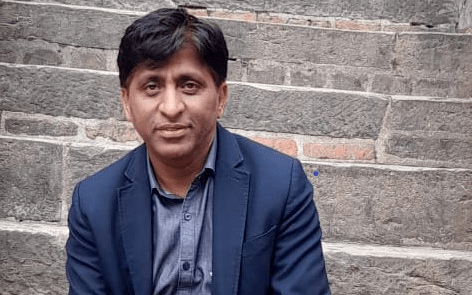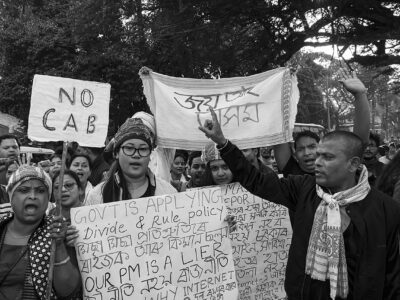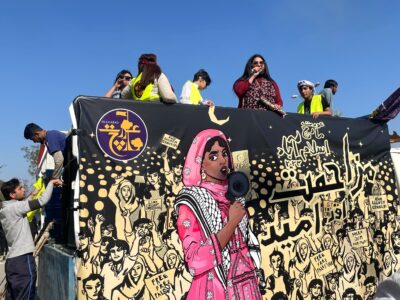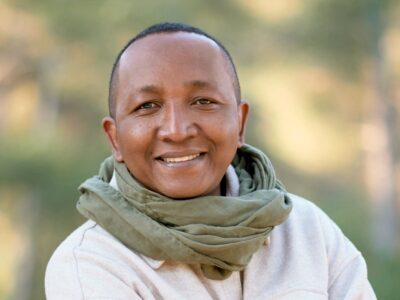
Vehivavy mpiasan'ny landihazo ao an-tanànakelin'i Meho Machi ao amin'ny distrikan'i Matiari ao Sindh, Pakistan. Via Javed Hussain. Nahazoana alalana.
Pakistan no mpamokatra landihazo faha-5 lehibe indrindra manerantany ary faritany roa ao Punjab sy Sindh no ahitana 99 isanjaton'ny famokarana landihazo ao Pakistan. Vehivavy maherin'ny dimy hetsy no miasa amin'ny fiotazana landihazo ao amin'ny faritanin'i Sindh ao Pakistan fotsiny. Na izany aza, noho ny tsy fahampian'ny fahaiza-mamaky teny sy manoratra sy manisa, matetika voambaka ny vehivavy ary kely ny karama aloan'ny mpamboly landihazo amin'izy ireo.
Nahavita zava-bita niavaka i Javed Hussain, mpiaro ny tontolo iainana avy any Pakistan, tamin'ny volana Novambra 2022 rehefa nahazo ny loka malaza ‘Gender Just Climate Solution Award’ tamin'ny Fihaonambe momba ny Toetrandro COP27 tany Ejipta noho ny tetikasany mitondra ny lohateny hoe ‘Fampandrosoana ny zon'ny vehivavy mpioty landihazo any Pakistan. ‘ Amin'ny maha-Mpitarika ny Tetikasa ao amin'ny Fikambanana tsy mitady tombony, Sindh Community Foundation (SCF) azy, niasa fatratra nandritra ny taona maro i Hussain mba hiarovana ny zon'ny vehivavy mpioty landihazo, izay miatrika fanamby roa amin'ny fisehon'ny toetrandro mahery vaika sy ny fiakaran'ny maripana.
Niantsafa an'i Javed Hussain tamin'ny alàlan'ny mailaka momba ny asany amin'ny fanatsarana ny fahaiza-mamaky teny sy ny zon'ny vehivavy mpioty landihazo ao Pakistan ny Global Voices. Nasiam-pandrindrana ny antsafa mba ho fohy sy mazava.
Global Voices (GV): Ianao no Pakistaney mpiaro ny tontolo iainana voalohany nahazo ny loka ‘Gender Just Climate Solution Award’. Lazao anay ny dianao nankany amin'ny fankatoavana manerantany.
Javed Husain (JH): The award was given in recognition of strengthening climate adaptation measures. This included establishing a training programme for women agricultural workers on climate awareness, climate justice and labor rights protection. Out of 259 organizations representing 119 countries, including Pakistan, that submitted their applications for the awards, only three were selected for recognition by The Women and Gender Constituency, UNCTCN, and Women Engage for a Common Future.
Javed Husain (JH): Nomena ny loka ho fankasitrahana ny fanamafisana ny fepetra fnaraham-bolontany ara-toetrandro. Tafiditra ao anatin'izany ny fametrahana fandaharan'asa fanofanana ho an'ny vehivavy mpiasan'ny fambolena amin'ny fanairana ara-toetrandro, ny rariny ara-toetrandro ary ny fiarovana ny zon'ny mpiasa. Amin'ireo fikambanana 259 misolo tena ny firenena 119, anisan'izany i Pakistan, izay nifaninana mba hahazo ny loka, telo ihany no nofantenana ho an'ny fankasitrahana avy amin'ny Women and Gender Constituency, UNCTCN, sy ny Women Engage for a Common Future.
GV: Lazao anay ny momba ny tetikasanao miaraka amin'ireo vehivavy mpioty landihazo ao Pakistan.
JH: The Sindh Community Foundation (SCF) is dedicated to protecting and improving the working conditions of women cotton workers in the Matiari District, a significant cotton-producing region in the Sindh province of Pakistan. The project is aimed at improving literacy skills, raise awareness of rights, and foster networking opportunities for women engaged in cotton picking, enabling them to secure fairer wages and safer working conditions. Supported by international development charity Feed the Minds, the project is being executed in ten villages located within the district.
JH: Ny Sindh Community Foundation (SCF) dia natokana ho amin'ny fiarovana sy fanatsarana ny fepetran'asan'ny vehivavy mpiasa amin'ny sehatry ny landihazo ao amin'ny Distrikan'i Matiari, faritra iray manan-danja amin'ny famokarana landihazo ao amin'ny faritanin'i Sindh ao Pakistan. Kinendrin'ny tetikasa ny hanatsarana ny fahaiza-mamaky teny sy manoratra, hanaitaitra amin'ny resaka zo, ary hampiroborobo ny hirika hitambajotran'ireo vehivavy mirotsaka amin'ny fiotazana landihazo ny tetikasa, ary ahafahan'izy ireo mahazo karama ara-drariny sy fepetra arak'asa azo antoka kokoa. Tohanan'ny fikambanana mpanao asa soa fampivoarana iraisampirenena Feed the Minds, tanterahina ao amin'ny tanàna folo ao anatin'ny distrika ny tetikasa.
GV: Ahoana no fiasan'ny SCF amin'ny fanatrarana ny rariny ara-toetrandro ho an'ny vehivavy mpiasa amin'ny fambolena?
JH: Approximately 1.5 million smallholder farmers rely on cotton cultivation as their primary source of livelihood. Cotton, which covers 15 percent of the country's cultivated land, is the most extensively grown crop. The burden of the cotton industry largely falls on women, with over half a million women engaging in cotton picking in Sindh and 50,000, specifically in Matiari. Despite their contributions, they remain poor and exploited. Their health also suffers from the hazardous working environment that involves excessive use of poisonous pesticides. Furthermore, the adverse effects of rising temperatures, reaching up to 49 degrees Celsius, have severely impacted their health, labor productivity, and overall livelihoods. Occupational health and safety are poor for these workers.
The recent floods had an adverse impact on the population of Sindh, affecting approximately 12 million people. These people had limited adaptation skills and climate literacy to effectively tackle the climate crisis. To address these issues, the Sindh Community Foundation (SCF) has taken proactive measures in creating climate change awareness skills in five villages within the Matiari district. Through these efforts, SCF has directly and indirectly reached out to 359 women cotton workers residing in these villages. After the training, SCF found that the women cotton workers had increased confidence, adaptation skills, safer working conditions and participation in climate change adaptation processes.
JH: Manodidina ny 1,5 tapitrisa eo ho eo ny tantsaha madinika miantehitra amin’ny fambolena landihazo ho loharanom-bola voalohany. Ny landihazo, izay mandrakotra ny 15 isanjaton'ny tany voavoly ao amin'ny firenena, no fambolena mavitrika be indrindra. Mitontona amin'ny vehivavy ny vesatry ny sehatrasa landihazo, ka vehivavy maherin'ny dimy hetsy no mioty landihazo ao Sindh ary 50.000 ao Matiari. Na eo aza izany fandraisana anjara izany dia mitoetra ho mahantra sy voambaka ry zareo. Tratra ihany koa ny fahasalaman-dry zareo noho ny tontolon'ny asa mampidi-doza amin'ny fampiasana fanafody famonoana bibikely misy poizina tafahoatra. Ankoatra izay ny voka-dratsin'ny fiakaran'ny maripàna, mahatratra hatramin'ny 49 degre Celsius, ka misy fiantraikany lalina amin'ny fahasalaman-dry zareo, amin'ny fahavokaran'asa sy ny fivelomany amin'ny ankapobeny. Ratsy fahasalamana sy fiarovana arakasa ireo mpiasa ireo.
Nisy fiantraikany ratsy teo amin'ny mponina tao Sindh ny tondra-drano vao haingana, nahatratra olona 12 tapitrisa eo ho eo. Tsy nahara-bolontany sy nahay namantatra ny toetrandro araka ny tokony ho izy ireo olona ireo hiatrehana amin'ny krizin'ny toetrandro. Ho fiatrehana ireo olana ireo, nandray fepetra mialoha ny Orina Mpanasoa an'ny Vondrom-piarahamonina Sindh (SCF) tamin'ny fananganana faanairana momba ny fiovan'ny toetrandro any amin'ny tanàna dimy ao anatin'ny distrikan'i Matiari. Tamin'ny alalan'ireo ezaka ireo, tafapaka mivantana na ankolaka tany amin'ireo vehivavy mpiasa amin'ny landihazo miisa 359 monina ao amin'ireo tanàna ireo ny SCF. Taorian'ny fiofanana, hitan'ny SCF fa nitombo ny fahatokisan-tena, ny fahaiza-manara-bolontany, teo amin'ireo vehivavy mpiasa amin'ny landihazo nahatsara kokoa ny fepetran'asa sy ny fandraisana anjara amin'ny fizotry ny fanaraham-bolontany.
GV: Azonao atao ve ny manazava kely ny amin'ny fomba ampiasan'ny SCF ny hetsika fikarohana nandraisan'ny feminista iray amin'ny fanatanterahana ny tetikasa?
JH: The Sindh Community Foundation (SCF) uses a Feminist Participatory Action Research (FPAR) approach to support the demands of women agriculture workers — particularly cotton pickers — to advocate for improved working conditions and health services in response to rising temperatures. Located in the Matiari District of Pakistan, the Foundation developed an innovative advocacy strategy linking social and climate justice, aiming to enhance climate adaptation measures. A key objective is to establish a training programme for 100 women agricultural workers, equipping them with knowledge on climate awareness, climate justice, and labor rights protection. Ultimately, SCF strives to influence policymakers to implement the Sindh Agriculture Women’s Protection Act of 2020.
SCF conducted training sessions to empower women leaders with the feminist participatory action research approach. These sessions included engaging in focus group discussions with women cotton pickers. At the advocacy level, we had interacted with policy makers to promote climate safety and improve working conditions, occupational health and safety protection and health protection and insurance for workers. As a result, the Sindh Government passed a law called Sindh Women Agriculture Workers Protect Act 2020. Despite some delays in the implementation of this act, with a collective voice, we could achieve a change in a policy.
JH: Mampiasa ny fomba fijerin'ny hetsika Fikarohana fandraisana anjara Feminista (FPAR) ny Orina Mpanasoa an'ny Vondrom-piarahamonina Sindh (SCF) hanohanana ny fitakian'ny vehivavy mpiasan'ny fambolena — indrindra ireo mpioty landihazo — mba hisolovava hanatsarana ny toetry ny asa sy ny servisy ara-pahasalamana ho setrin'ny fiakaran'ny maripana. Niorina ao amin'ny Distrikan'i Matiari ao Pakistan ny Orina Mpanasoa hamolavolana tetipanorom-pisoloam-bava vaovao mifandray amin'ny rariny ara-tsosialy sy ara-toetrandro, ikendrena hanatsarana fepetra fanaraham-bolontany ara-toetrandro. Tanjona iray lehibe ny fametrahana programam-panofanana ho an'ny vehivavy mpiasan'ny fambolena 100, hampitao azy ireo fahalalàna amin'ny fanairana ara-toetrandro, rariny ara-toetrandro ary ny fiarovana ny zon'ny mpiasa. Amin'ny farany, mikiry ny SCF hitaona ireo mpanao lalàna hametraka lalàna fiarovana ny vehivavin'ny fambolena ao Sindh tamin'ny taona 2020.
Nitarika fotoam-piofanana ny SCF hanome vahana ny mpitarika vehivavy amin'ny fomba fikarohana fandraisana anjara feminisita. Tafiditra amin'ireny fotoana ireny ny firotsahana hifantoka amin'ny fifanakalozan-kevitra amin'ireo vehivavy mpioty landihazo. Eo amin'ny sehatra fisoloam-bava indray, nifanerasera tamin'ireo mpamolavola lalàna izahay hampiroborobo ny fiarovana ara-toetrandro sy hanatsara ny fepetran'ny asa, fahasalamana sy fiarovana arakasa ary ny fiarovana ny fahasalamana sy ny fiantohana ho an'ny mpiasa. Vokatr'izany, nandany lalàna iray antsoina hoe lalànan'ny taona 2020 ho fiarovana ny vehivavy mpiasan'ny fambolena ao Sindh ny Governemanta Sindh. Na dia eo aza ny fahataràna sasany amin'ny fampiharana an'io lalàna io, noho ny firaisam-peon'ny rehetra, afaka manova lalàna isika.
GV: Inona no drafitrareo rahampitso amin'ny fanamafisana ny fepetra fanaraham-bolontany ara-toetrandro eto Pakistan?
JH: We are devoted to improving the climate resilience of female cotton workers and boosting their knowledge and adaptation skills in Sindh.
Our initiative aims to empower a significant number of women, approximately 30,000 individuals benefiting from literacy skills through the establishment of 600 literacy centers. Besides basic literacy, these centers will improve climate literacy, awareness of occupational health and safety, and promote decent work environment and off-season poverty reduction programmes. Similarly, our focus also remains in initiating women led climate justice campaign, gender transformation, climate justice and resilience and labor rights protection of women cotton workers. The other important part is advocacy for implementation of laws and policy commitments and social safety nets and aligning with the Nationally Determined Contributions (NDCs).
JH: Manokan-tena izahay hanatsara ny fahazakàn'ny vehivavy mpioty landihazo toetrandro sy hampiroborobo ny fahalalàny sy ny fahakingana hanara-bolontany ao Sindh.
Kendren'ny hetsika ataonay ny hanome vahana vehivavy marobe,manodidina ny 30.000 misitraka fahaiza-mamaky teny sy manoratra amin'ny alalan'ny fananganana ivotoeram-pampianarana mamaky teny 600. Ankilan'ny fahaiza-mamaky teny tsotsotra, hohatsarain'ireo ivotoerana ireo ny fahaiza-mamaky toetrandro, ny fanentanana ara-pahasalamana sy fiarovana arak'asa, ary hampiroborobo tontolon'asa mendrika sy fandaharan'asa fampihenana ny fahantrana amin'ny maitso ahitra. Torak'izany ihany koa, ifantohanay ny fitarihana ny vehivavy ho amin'ny fanentanana ny rariny ara-toetrandro, ny fiofoan'ny karazana (genre), ny rariny ara-toetrandro sy ny fiaretana sy ny fiarovana ny zon'ny vehivavy mpioty landihazo. Ampahany iray hafa manan-danja ny fanentanana ametrahana lalàna sy ny fanoloran-tena ara-politika ary haraton'aina ara-tsosialy sy fijoroana miaraka amin'ny Anjara biriky nidìka ao amin'ny firenena (NDCs).







